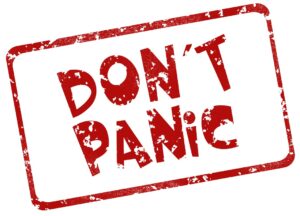Anxiety is one of the most common feelings that we can have. That feeling of fear or uncertainty when there is going to be a substantial change. That feeling you get right before you go over the big hill on a roller coaster. So why do we have this feeling? What is its purpose? How can DBT help to reduce anxiety when we cannot manage it?

Anxiety comes from the fight, flight, or freeze mechanism in our bodies. Think back to when instead of going to the grocery store for meat people had to go out and hunt for it. Imagine not having that gut feeling when a twig breaks that tells you to run, hide, or freeze. That is anxiety, your body’s way of warning you about danger. It can wake you up from a dead sleep to save your life. The issue is we do not live in these times.
Now what we perceive as a threat has changed. It can be anything from another person being upset with you, to a car running a red light. The dangers are different and occur less frequently, but that does not turn our instincts off. Anxiety becomes an anxiety disorder when that instinct starts alerting to threats that cannot be identified. When the fight or flight response does not turn off you are constantly sitting on edge. It can also become a disorder when the anxiety reaction is too extreme for the situation.
This one can be difficult to understand so for example:
When I was younger, I had a phobia of raw meat. It started with me not touching the packaging of raw meat and slowly became to where I would have panic attacks going into the meat section at the grocery store, so I would avoid the meat section altogether. Here, the extreme reaction of panic attacks at the grocery store was not effective and started to inhibit functioning in my daily life, not to mention putting myself at more risk. Is the fear of raw meat justified, well that depends, yes there are times when touching raw chicken and then touching your face before washing your hands can make you sick. However, the anxiety is not justified to the level of avoiding a section of a grocery store because there was no actual threat to my life, health, or well-being by going through the section. This is one example of how anxiety can become an anxiety disorder or phobia.
So how can we treat anxiety disorders?
In my example above I slowly went through exposure therapy to treat the phobia. For general anxiety, many skills in DBT can help reduce anxiety and challenge the catastrophic thinking that often comes with anxiety.
When your anxiety is high, and you rate yourself at a SUDS level of 70 or above, distress tolerance skills are necessary.
These skills are also the best way to stop or reduce a panic attack brought on by anxiety.
- TIPP will help to reduce your heart rate and slow your breathing down, which are both elevated when anxiety occurs.
- Distract with ACCEPT can also help to take your focus away from anxiety and anxious thoughts. Personally, when I was going through exposure for the situation above, I would use distract with ACCEPT by shuffling playing cards. This activity took just enough of my attention away from the anxiety to help me calm down.
Once the rating on SUDS is lower than a 70 it is time to use your emotion regulation skills to:
- Check the facts, and either do opposite action or problem solve.
- A lot of anxiety comes from believing our thoughts as facts and from our interpretations of a situation. Checking the facts will help to work through what is truly there through our senses and what we are interpreting.
- Decide whether it is effective to act on our anxiety or to find a way to continue to reduce it.
The idea of anxiety started as a basic concept to help us survive in life. Now that we do not have to look over our shoulders each day anxiety has become more nuanced, which makes it harder to interpret and understand. With DBT we can work towards learning how to control our anxiety and build a life worth living!
If you want more help with skills like this, join our skills training groups or schedule with a therapist at CCDBT. We’d love to go more in-depth with this skill and many more like it!
About the Author
Samantha Ruwe (she/her), M.A., LPC is a Licensed Professional Counselor who specializes in dialectical behavior therapy. She works with teens and adults in a warm, compassionate, and non-judgmental manner to help clients build a life worth living. Samantha knows that therapy can be daunting to begin and is supportive of clients at all parts of their counseling journey. Click here to learn more about Samantha’s experience and therapeutic approach.


